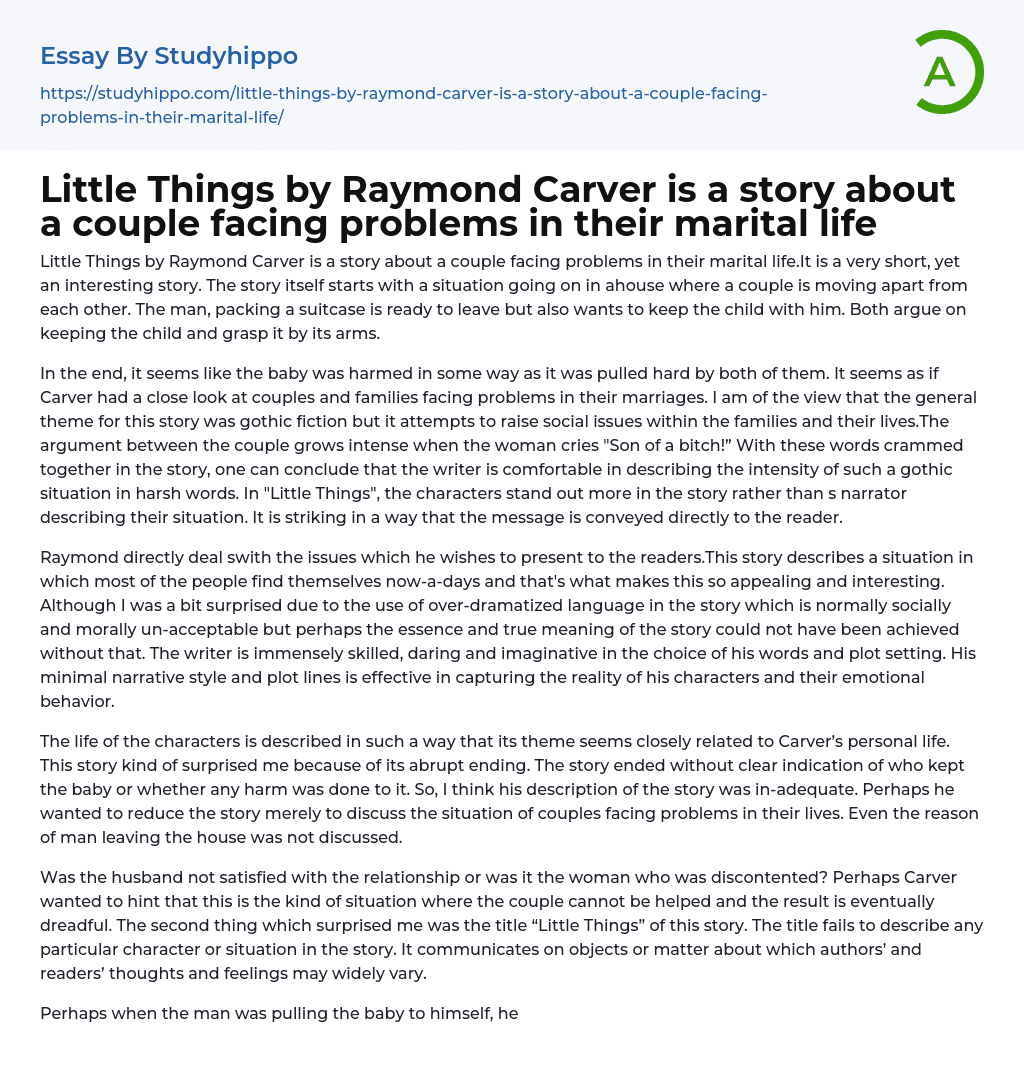Little Things by Raymond Carver is a story about a couple facing problems in their marital life.It is a very short, yet an interesting story. The story itself starts with a situation going on in ahouse where a couple is moving apart from each other. The man, packing a suitcase is ready to leave but also wants to keep the child with him. Both argue on keeping the child and grasp it by its arms.
In the end, it seems like the baby was harmed in some way as it was pulled hard by both of them. It seems as if Carver had a close look at couples and families facing problems in their marriages. I am of the view that the general theme for this story was gothic fiction but it attempts to raise social issues within the families and their lives.The argument between
...the couple grows intense when the woman cries "Son of a bitch!” With these words crammed together in the story, one can conclude that the writer is comfortable in describing the intensity of such a gothic situation in harsh words. In "Little Things", the characters stand out more in the story rather than s narrator describing their situation. It is striking in a way that the message is conveyed directly to the reader.
Raymond directly deal swith the issues which he wishes to present to the readers.This story describes a situation in which most of the people find themselves now-a-days and that's what makes this so appealing and interesting. Although I was a bit surprised due to the use of over-dramatized language in the story which is normally socially an
morally un-acceptable but perhaps the essence and true meaning of the story could not have been achieved without that. The writer is immensely skilled, daring and imaginative in the choice of his words and plot setting. His minimal narrative style and plot lines is effective in capturing the reality of his characters and their emotional behavior.
The life of the characters is described in such a way that its theme seems closely related to Carver’s personal life. This story kind of surprised me because of its abrupt ending. The story ended without clear indication of who kept the baby or whether any harm was done to it. So, I think his description of the story was in-adequate. Perhaps he wanted to reduce the story merely to discuss the situation of couples facing problems in their lives. Even the reason of man leaving the house was not discussed.
Was the husband not satisfied with the relationship or was it the woman who was discontented? Perhaps Carver wanted to hint that this is the kind of situation where the couple cannot be helped and the result is eventually dreadful. The second thing which surprised me was the title “Little Things” of this story. The title fails to describe any particular character or situation in the story. It communicates on objects or matter about which authors’ and readers’ thoughts and feelings may widely vary.
Perhaps when the man was pulling the baby to himself, he was not caring that he could be hurting the baby and was regarding it as a mere little thing. They both were treating the baby more like a possession rather than a person. In
our effort to make sense of and conclude the story, we can simply compare it to the lives of couples which have been drastically reached the level of separation from each other. This story can be judged as a work in which the writer has avoided to spell out his opinions more clearly to his readers.
- Christina Rossetti essays
- Emily Dickinson essays
- Ernest Hemingway essays
- Percy Bysshe Shelley essays
- Robert Browning essays
- Robert Louis Stevenson essays
- Seamus Heaney essays
- Carol ann duffy essays
- Anne Bradstreet essays
- Elizabeth Bishop essays
- Peter Skrzynecki essays
- Poets essays
- Robert Frost essays
- Aldous Huxley essays
- Anton Chekhov essays
- Charles Dickens essays
- Edgar Allan Poe essays
- F. Scott Fitzgerald essays
- Harper Lee essays
- Homer essays
- Jane Austen essays
- John Steinbeck essays
- Kurt Vonnegut essays
- Mark Twain essays
- Mary Shelley essays
- Nathaniel Hawthorne essays
- Sophocles essays
- Stephen King essays
- William Shakespeare essays
- Zora Neale Hurston essays
- Amy tan essays
- Virginia woolf essays
- Alice Walker essays
- Chinua Achebe essays
- Sherman Alexie essays
- George Orwell essays
- Sylvia Plath essays
- T. S. Eliot essays
- W. H. Auden essays
- Wilfred owen essays
- William blake essays
- Kate Chopin essays
- Oscar Wilde essays
- Phillis Wheatley essays
- Ray Bradbury essays
- Richard Rodriguez essays
- Walt Whitman essays
- The Tempest essays
- Leonardo Da Vinci essays
- Thomas Hardy essays




